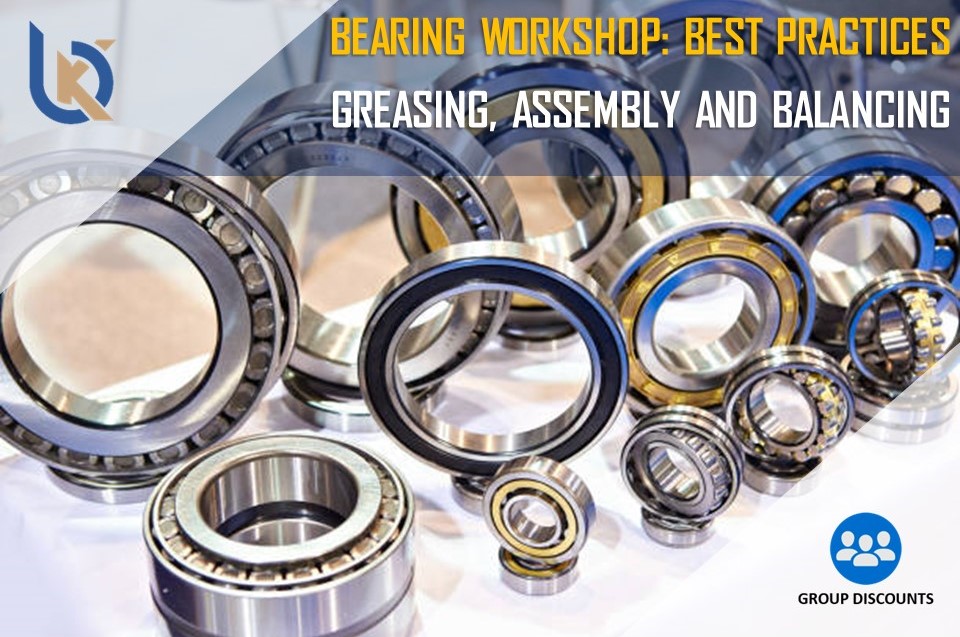Summary
The Bearings and Lubrication Principles course give you the knowledge and techniques to significantly reduce operating and energy costs and extend the life of your rotating equipment. In addition to bearings and lubrication, this course also covers basic coupling systems and shaft alignment.
Learn the different bearing and coupling systems, including their function, load tolerance, and operating characteristics. The lubrication chapter will present industry test methods used to define various lubricant characteristics, lubrication chemistry, and proper application methods. This course will help anyone who has to specify, purchase, install, maintain, or repair bearing and coupling systems.
This five-day course covers principles and applications of various types of bearings, including plain journal, ball, and roller bearings. It explains the installation, inspection, and repair of bearings, and deals with specialized bearings. Covers bearing failure modes, lubrication, Failure analysis, and services practices.
Reference
Not Available
Objective
At the end of the course, participants will be able to :
- Bearing types and nomenclature
- Bearing selection, installation, pre-loading, and alignment considerations
- Troubleshooting and inspecting bearings
- Grade and precision of bearings
- Shaft bore and housing fits
- Lubrication fundamentals and selection of grease and oils
- Automatic lubrication systems
- Coupling types, function, and nomenclature
- Coupling and shaft alignment
- Learn the different bearing systems, including proper selection, and installation procedures
- Learn the basics of industry testing, specifying and application of lubricants
- Learn coupling types and characteristics.
Who should attend
- Plant & facility maintenance technicians
- Apprentice and experienced HVAC technicians
- Energy management personnel
- Electricians
- Building engineers
- Plant & facility managers
- Stationary engineers
- Anyone who needs cross-training on rotating equipment
Additional Information
As per request
Bearing Workshop - Best Practices - Greasing, Assembly and Balancing
-
Basic concepts
-
The relationship between power, speed and torque
-
Calculate the linear velocity of a rotating component
-
Calculate speed ratio
-
Efficiency and service factors
-
Types and nomenclature
-
Covers both friction and rolling element bearings
-
Covers both mounted and unmounted categories
-
Installation and maintenance of bearings
-
Troubleshoot bearing failures
-
Selection considerations for bearings
-
Shaft and housing fits
-
Shaft and Housing Design
-
Housings
-
Misalignment
-
Replacement Considerations
-
Mounting Accessories
-
Shaft and Housing Fits
-
- Bearing Fit Criteria
-
- Checking Fit Integrity
-
- Bearing Internal Clearances
-
- Typical Fit Examples
-
Fixing of Bearings
-
- Tolerances
-
- Mounting Preparation
-
- Cold, temperature and hydraulic mounting
-
- Types of shaft mounting Mechanical Mounting
-
- Temperature Mounting
-
- Mounting with Sleeves Hydraulically
-
How to fit and remove common bearing types
-
Using workshop and specialist fitting tools
-
Effects of Loose Fit: Rotating Shaft and Inner Ring
-
Bearing Arrangements
-
Dismounting Procedures
-
Removal Techniques
-
Select the right Lubricant
-
The right Lubrication method and amount
-
Terminology including viscosity, fire point flash point, NLGI number and many other characteristics
-
Properties
-
Industry test procedures
-
Selecting a coupling
-
Energy savings
-
Shaft alignment process and its importance
-
Different types of soft foot
-
Shaft versus coupling alignment
-
Different types of flexible couplings
-
Coupling installation and interference fit
- BK Management Team believe that learning is not only about acquiring technical skills, it is also about learning behaviors & Competencies that are desirable for work in plant operation & maintenance critical dimensions. Our holistic teaching develops our delegates' personal effectiveness to function both as an individual and as a team player. The course delivery & modes of instruction will incorporate theory , practical skills and Q&A sessions.
- To enhance learning outcomes, theory sessions will comprise classroom based lecture that will intersperse with interactive discussions, scenario-based, case-study, group exercises, video clips, power point slides, learners' Guide and the application of various tools which will be provided to help in the delegates and participants of the learning’s objectives. With successful implementation of the learnt skills they are bound to enhance Individual & Organizational growth.
- For online / Interactive Virtual sessions, Delegate should have a stable & good Internet connection on his Laptop.
On successful completion of this training course, BK’s Certificate with eligible Continuing Professional Education credits (CPE), will be awarded to the delegates, one CPE credit is granted per 50 minutes of attendance.
